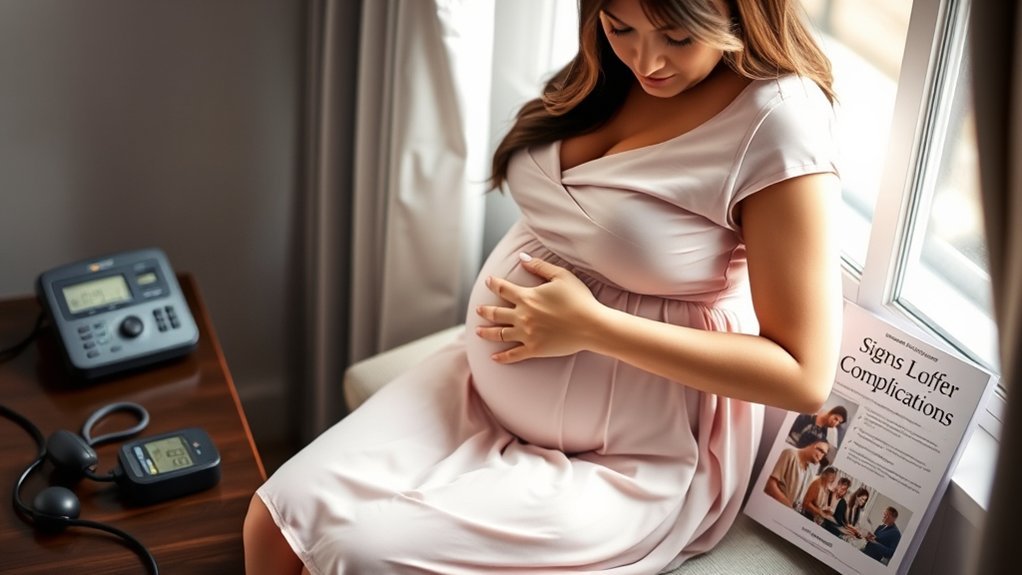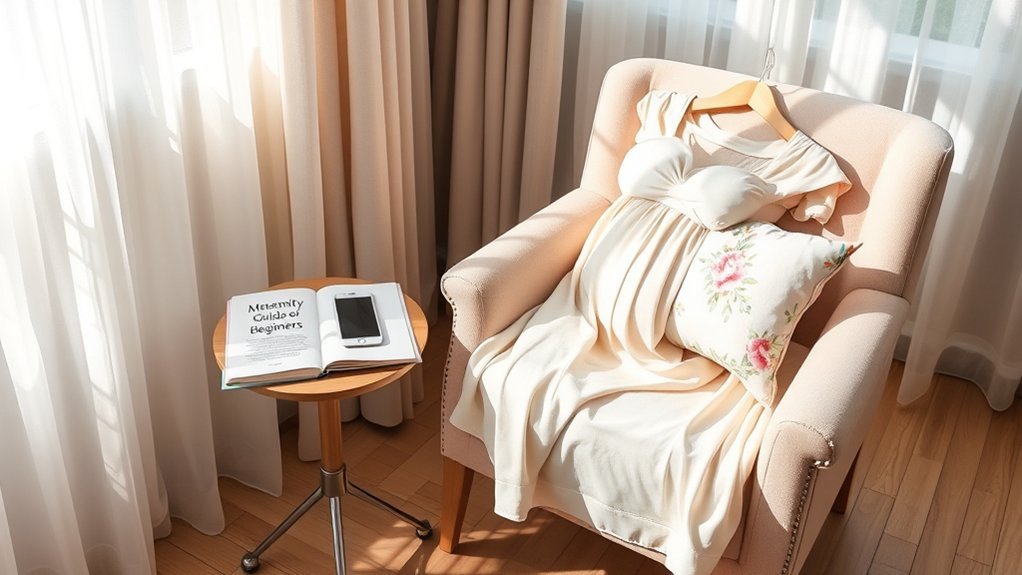You might think that maternity clothes are just about style, but comfort and health play a vital role too. If you’re feeling any discomfort or tightness, it’s important to pay attention. Ignoring these signals could lead to complications that affect both you and your baby. So, how do you know when it’s time to reach out for help? Let’s explore some key indicators that may require a conversation with your doctor.
Understanding Your Body’s Changes During Pregnancy

As you navigate the beautiful yet challenging journey of pregnancy, it’s essential to understand the changes happening in your body. Your hormones are in overdrive, and you might notice shifts in your mood, energy levels, and appetite.
Your body is working hard to nurture your growing baby, which often means experiencing physical transformations like breast tenderness, weight gain, and a growing belly. Embrace these changes, as they signify the life blossoming within you.
It’s normal to feel overwhelmed at times, but remember that each phase is temporary. Staying connected with your healthcare provider can help you understand what’s typical and what’s not.
Common Discomforts: When to Seek Help

Pregnancy can bring a range of discomforts, but it’s important to know when something might be off.
If you’re experiencing unusual pain, severe nausea, or significant swelling and cramps, don’t hesitate to reach out to your doctor.
Trust your instincts—your health and your baby’s well-being are worth a conversation.
Unusual Pain Symptoms
What should you do if you experience pain that feels different from the usual pregnancy discomforts?
It’s important to trust your instincts. If you notice sharp, persistent, or unusual pain, don’t hesitate to reach out to your doctor. This could be a sign that something needs attention.
Pay close attention to the location and intensity of the pain; for instance, pain in the upper right abdomen, sudden pelvic pain, or severe headaches warrant immediate consultation.
You’re not overreacting by seeking help; your health and your baby’s well-being are paramount.
Severe Nausea Episodes
While experiencing nausea can be a normal part of pregnancy, it’s crucial to recognize when it becomes severe or unmanageable.
If you find yourself unable to keep food or liquids down for more than 24 hours, or if nausea is accompanied by intense vomiting, it’s time to reach out to your doctor.
Severe nausea can lead to dehydration and nutritional deficiencies, which aren’t good for you or your baby.
Pay attention to symptoms like dizziness, rapid heartbeat, or extreme fatigue, as these might indicate a need for immediate medical attention.
You deserve support during this challenging phase, so don’t hesitate to communicate your concerns.
Swelling or Cramps
As you navigate the journey of pregnancy, it’s not uncommon to experience swelling or cramps, but knowing when to seek help is essential.
Mild swelling in your feet or ankles can often be normal, especially in the later stages. However, if you notice sudden or severe swelling in your hands, face, or legs, it could signal a serious condition like preeclampsia, and you should contact your doctor immediately.
Cramps can also vary; while light cramping can be part of your body’s adjustments, sharp or persistent pain may warrant attention.
Trust your instincts—if something feels off, don’t hesitate to reach out for support. You deserve to feel safe and informed throughout this journey.
Signs of Complications to Watch For

Recognizing signs of complications during pregnancy is essential, especially when you want to guarantee both your health and your baby’s. Pay attention to the following signs that may indicate complications:
| Symptom | What It Could Mean | When to Call a Doctor |
|---|---|---|
| Severe abdominal pain | Ectopic pregnancy or miscarriage | Immediately |
| Heavy bleeding | Placental abruption | Immediately |
| Severe headaches | High blood pressure | If persistent or worsening |
| Sudden swelling | Preeclampsia | If accompanied by other symptoms |
| Decreased fetal movement | Fetal distress | If not felt for 24 hours |
Trust your instincts; if something feels off, don’t hesitate to reach out to your healthcare provider. Your peace of mind is vital during this time.
Choosing the Right Fabric for Comfort
When you’re choosing maternity clothes, the fabric can make a big difference in your comfort.
Opt for breathable materials that allow air circulation and help keep you cool, especially as your body changes.
Stretchy fabrics are also a great choice, as they can accommodate your growing belly while still feeling comfortable and supportive.
Breathable Materials Importance
Finding the right fabric for your maternity clothes can make all the difference in your comfort. Breathable materials help regulate your body temperature and prevent discomfort as your body changes. Choosing the right fabric can keep you feeling fresh and at ease throughout your day. Here’s a quick comparison of popular breathable materials:
| Fabric Type | Benefits | Ideal For |
|---|---|---|
| Cotton | Soft, lightweight | Everyday wear |
| Linen | Highly breathable | Warm weather |
| Bamboo | Moisture-wicking | Sensitive skin |
| Rayon | Soft drape | Dressier occasions |
| Modal | Stretchy and comfy | Loungewear |
When you prioritize breathable fabrics, you’re investing in your comfort and well-being during this special time.
Stretchy Fabric Benefits
Breathable fabrics are great, but stretchy materials take comfort to another level during pregnancy. These fabrics adapt to your changing body, offering support without constriction.
You’ll appreciate how they move with you, allowing for ease during any activity. Choosing the right stretchy material can make a significant difference in your daily comfort.
- Flexibility: Moves with your body as you grow.
- Support: Provides gentle support for your belly.
- Breathability: Keeps you cool and comfortable.
- Durability: Stands up to daily wear and washes.
- Style: Available in various styles to suit your taste.
Investing in stretchy maternity clothes helps you feel confident and comfortable, letting you focus on enjoying this beautiful journey.
Styles That Accommodate Your Growing Bump
As your body transforms throughout pregnancy, choosing the right styles that accommodate your growing bump becomes essential for comfort and confidence.
Opt for dresses with empire waists, which can highlight your curves while providing room for expansion. Tunics paired with leggings or maternity jeans offer a versatile look that grows with you.
Look for tops made from soft, breathable fabrics that gently hug your body without constricting. Wrap dresses are another fantastic choice, as they adjust easily to your changing shape.
Don’t forget about layering; cardigans and lightweight jackets can add style while keeping you cozy.
Supportive Undergarments: What You Need to Know
When you’re managing the changes of pregnancy, supportive undergarments can make a world of difference in your comfort and confidence.
They provide essential support to your growing body, helping ease discomfort and alleviate pressure.
Here’s what you need to know:
- Maternity bras: Designed to provide extra support and accommodate your changing size.
- Belly bands: Offer gentle support for your bump, helping to relieve back pain.
- Compression garments: Improve circulation and reduce swelling in your legs.
- Nursing bras: Make breastfeeding easier, with features like easy access and extra support.
- Shapewear: Can smooth out your silhouette while providing light support.
Investing in the right undergarments can truly enhance your pregnancy experience, allowing you to feel more at ease as your body transforms.
Dressing for Different Stages of Pregnancy
Choosing the right clothes throughout your pregnancy can greatly impact your comfort and confidence.
In your first trimester, opt for stretchy fabrics and loose-fitting tops that accommodate your growing belly without sacrificing style.
As you progress into the second trimester, embrace maternity-specific clothing designed to support your shape, like belly bands and fitted dresses.
By the third trimester, prioritize comfort with breathable materials and roomy silhouettes that allow for movement. Layering can also help you adjust to fluctuating temperatures.
Remember, choosing clothes that make you feel good can boost your mood. Don’t hesitate to experiment with styles, colors, and patterns—you deserve to express yourself beautifully as you navigate this incredible journey.
Your comfort is key, so listen to your body and dress accordingly.
The Importance of Footwear During Pregnancy
Finding the right clothing can make a significant difference in how you feel during pregnancy, but don’t overlook the importance of footwear. Your feet endure extra pressure as your body changes, so choosing the right shoes is vital. Proper footwear can help reduce discomfort and support your growing belly.
Choosing the right shoes is crucial during pregnancy to reduce discomfort and support your changing body.
Consider these essential features when selecting shoes:
- Arch support: Helps distribute weight evenly.
- Cushioning: Provides shock absorption for your feet.
- Non-slip soles: Reduces the risk of falls.
- Wide fit: Accommodates swelling that often occurs.
- Breathable materials: Keeps your feet cool and comfortable.
Investing in supportive shoes can make all the difference in your daily routine, enhancing your comfort as you navigate this beautiful journey.
When to Consult Your Doctor About Maternity Clothes
Have you ever wondered if your maternity clothes could be affecting your well-being? It’s important to pay attention to how your clothing feels against your body.
If you experience discomfort, tightness, or skin irritation, it might be time to consult your doctor. Additionally, if you notice any swelling in your legs or feet, or if your clothes seem to restrict your movement, don’t hesitate to reach out.
These could be signs that your attire is impacting your health. Your comfort is essential during this special time, so listen to your body.
Always prioritize your well-being, and remember that your doctor is there to support you in making the best choices for both you and your baby.
Frequently Asked Questions
Can I Wear My Regular Clothes During Early Pregnancy?
Yes, you can wear your regular clothes during early pregnancy, especially if they still fit comfortably. As your body changes, listen to your needs, and shift to maternity wear when you feel it’s necessary.
What Are the Best Colors for Maternity Clothes?
Choosing maternity clothes is like painting a canvas; soft pastels and vibrant jewel tones can brighten your wardrobe. Opt for colors that lift your spirits and reflect your personality, making you feel confident and beautiful during pregnancy.
How Do I Choose the Right Maternity Size?
To choose the right maternity size, measure your bust, waist, and hips, then refer to the brand’s size chart. Remember, comfort’s key, so opt for stretchy fabrics that accommodate your growing belly. You’ve got this!
Are There Maternity Clothes for Breastfeeding?
Yes, there are maternity clothes designed for breastfeeding! You’ll find versatile options, like nursing tops and dresses, that allow easy access while keeping you comfortable. Embrace styles that suit your taste and make breastfeeding simpler.
What Accessories Complement Maternity Outfits?
You’ll find that scarves, statement jewelry, and comfortable shoes really enhance your maternity outfits. A stylish handbag can also add flair, helping you feel confident and put-together while embracing your beautiful journey into motherhood.
Conclusion
As you navigate the journey of pregnancy, remember that your comfort is paramount. Did you know that nearly 70% of pregnant women experience some form of discomfort due to tight or restrictive clothing? It’s essential to listen to your body and prioritize your well-being. If you’re feeling any unusual symptoms, don’t hesitate to reach out to your healthcare provider. Embrace this time by choosing clothing that supports you and your growing bump, ensuring both you and your baby stay happy and healthy.
